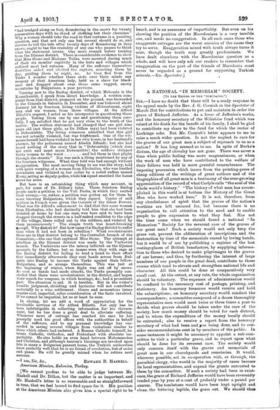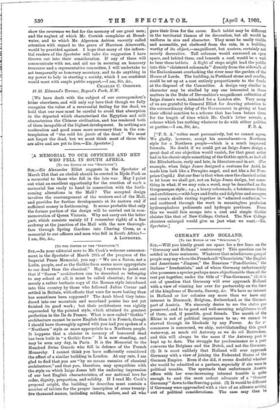A NATIONAL "IN MEMORIAM" SOCIETY.
[To THE EDITOR OP THE "SPECTATOR.") SIR,—I have no doubt that there will be a ready response to the appeal made by the Rev. J. G. Cornish in the Spectator of March 21st for contributions to put and maintain in order the grave of Richard Jefferies. As a lover of Jefferies's works, and the honorary secretary of the Wiltshire fund which was raised at his death for the benefit of his family, I shall be glad to contribute my share to the fund for which the rector of Lockinge asks. But Mr. Cornish's letter appears to me to raise a much wider question. Is not the neglect to care for the graves of our great men a subject of reproach to us as a nation ? It has long seemed so to me. In spite of Burke's dictum, the age of chivalry has not gone. There was never a time when public feeling Was more magnanimous, or when the work of men who have contributed to the welfare of their fellows was held in more grateful remembrance. The imposing procession which issues from the printing-press of cheap editions of the writings of great authors and of the biographies of all great men is a testimony of the ever-growing appreciation of the record of what Carlyle calls "the soul of the whole world's history." "The history of what man has accom- plished in this world is at bottom the History of the Great Men who have worked here." It is not, therefore, from any churlishness of spirit that the graves of the nation's worthies are left uncared for, but because there is no organisation to call attention to the need and to enable people to give expression to what they feel. Has not the time come when we should found a national "In Memoriam" Society for the reverent care of the graves of our great men ? Such a society would not only keep the grass cut, prevent the obliteration of inscriptions and the destruction by time of the memorials reared by loving hands, but it would be of use by publishing a register of the last resting-places of British benefactors, by supplying informa- tion to those who desired to make pilgrimages to the graves of our heroes; and thus, by furthering the interest of large numbers of our people in the great dead, contribute to those causes which tend to elevate and strengthen national life and character. All this could be done at comparatively very small cost. At the outset, at any rate, the whole organisation should be voluntary. The expenses of administration would be confined to the necessary cost of postage, printing, and stationery. An honorary treasurer would receive and hold the subscriptions ; an honorary secretary would conduct the correspondence; a committee composed of a dozen thoroughly representative men would meet twice or three times a year to decide what graves should be taken under the care of the society, how much money should be voted for each district, and to whom the expenditure of the money locally should be entrusted ; also to receive a report from the honorary secretary of what had been and was being done, and to con- sider recommendations sent in by members of the public. In some instances it might be necessary to appoint a sub-com- mittee to visit a particular grave, and to report upon what should be done for its reverent care. The society would only concern itself with the graves and memorials of great men in our churchyards and cemeteries. It would, wherever possible, act in co-operation with, or through, the parochial clergy, who would in the majority of cases become its local representatives, and expend the grants entrusted to them by the committee. If such a society bad been in exist- ence, the grave of Richard Jefferies would have been reverently tended year by year at a cost of probably under a pound per annum. The tombstone would have been kept upright and clean, the lettering legible, the grass cut. We should -awl
show the reverence we feel for the memory of our great men; and the neglect of which Mr. Cornish complains at Broad- water, and to which Mr. Algernon Ashton recently called attention with regard to the grave of Harrison Ainsworth, would be provided against. I hope that many of the influen- tial readers of the Spectator will take the suggestion I have thrown out into their consideration. If any of them will communicate with me, and aid me in securing an honorary treasurer and a representative committee, I will undertake to act temporarily as honorary secretary, and to do anything in my power to help in starting a society, which I. am confident would meet with ample public support. —I am, Sir, &c., CHARLES C. OSBORNE.
16 St. Edmund's Terrace, Regent's Park, N.W.
[We have dealt with the subject of our correspondent's letter elsewhere, and will only say here that though we fully recognise the value of a reverential feeling for the dead, we hold that our race must be careful to avoid that absorption in the departed which characterised the Egyptian and still characterises the Chinese civilisation, and has rendered both of them incapable of the highest development. In nothing are moderation and good sense more necessary than in the con- templation of "the cold hic jacets of the dead." We must not forget the dead, but we must think most of those who are alive and are yet to live.—En. Spectator.]











































 Previous page
Previous page